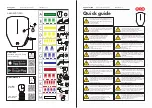
*
NOTE Damage to the drive train, trans‐
mission or trailer tow hitch due to excess
gross combination weight
The permissible gross combination weight is
exceeded.
The drive train, the transmission or the trailer
tow hitch may be damaged.
#
Comply with the permissible gross com‐
bination weight.
For vehicles with a permissible gross vehicle
weight of 11030 lbs (5003 kg), the permissible
gross combination weight is less than the sum of
the permissible gross vehicle weight plus the per‐
missible trailer load. If either the vehicle or the
trailer is fully laden, the permitted gross vehicle
weight or the permitted trailer load values are
reduced accordingly. In this case, you may only
partially load the trailer or the vehicle.
The gross trailer weight (GTW) is calculated by
adding the weight of the trailer to the weight of
the load and equipment. If the trailer is equipped
with a separate braking system, then the maxi‐
mum gross trailer weight is 5000 lbs (2268 kg) or
7500 lbs (3402 kg).
The maximum permissible trailer drawbar nose‐
weight on the ball head is 500 lbs (227 kg) or
750 lbs (340 kg). However, the actual trailer
drawbar noseweight must not exceed the value
given on the trailer tow hitch or trailer identifica‐
tion plates. Where the values differ, the lowest
value always applies.
The permissible gross weight for vehicle-trailer
combinations (GCWR) is calculated by adding the
gross weight of the trailer to the gross vehicle
weight including a driver's weight of approx‐
imately 150 lbs (68 kg). The maximum permissi‐
ble gross combination weight is vehicle-specific
and equipment-dependent. When driving with a
trailer, you should not exceed the maximum per‐
mitted permissible gross weight for vehicle-trailer
combinations (GCWR).
The permissible values, which must not be excee‐
ded, can be found in your vehicle documents and
on the identification plates of the trailer tow
hitch, the trailer and the vehicle. The values
approved by the manufacturer can also be found
in the "Technical data" section. Where the values
differ, the lowest value always applies.
Loading the trailer
Use a drawbar noseweight that is as close as
possible to the maximum permissible nose‐
weight. Do not undershoot the minimum permis‐
sible noseweight. Otherwise, the trailer may
become detached.
R
Distribute the load over the vehicle and the
trailer so as not to exceed either the maxi‐
mum permissible values for the gross vehicle
weight rating (GVWR) and gross trailer weight
(GTW), the permissible gross weight for vehi‐
cle-trailer combinations (GCWR), nor the max‐
imum permissible gross axle weight rating
(GAWR) and trailer drawbar noseweight (TWR)
of your vehicle.
R
Add the rear axle load to the trailer drawbar
noseweight of the trailer drawbar on the ball
head (TWR). This will ensure that you do not
exceed the permissible gross axle weight rat‐
ing (GAWR).
R
Add the vehicle load to the trailer drawbar
noseweight of the trailer drawbar on the ball
head (TWR). This will ensure that you do not
exceed the permissible gross vehicle weight
rating (GVWR).
Checking the vehicle and trailer weight
R
Make sure that the weights of the towing
vehicle and the trailer comply with the maxi‐
mum permissible values. Have the car/trailer
combination weighed on a calibrated weigh‐
ing machine. The car/trailer combination
comprises the towing vehicle including driver,
passengers and load as well as the laden
trailer.
R
Check the maximum permissible gross axle
weight rating of the front and rear axles
(GAWR), the gross trailer weight (GTW), the
permissible gross weight for vehicle-trailer
combinations (GCWR) and the trailer drawbar
noseweight rating (TWR).
Trailer power supply
Incorrect cabling of the connector plug may inter‐
fere with other electronic systems in the vehicle.
Freightliner Sprinter therefore recommends that
you have the cabling of the connector plug car‐
ried out at a qualified specialist workshop.
You can connect accessories up to a maximum of
240 W to the permanent power supply. Do not
charge a trailer battery using the power supply.
Your vehicle may be equipped with a range of
electrical equipment for trailer operation.
Depending on your trailer, you may need an
Driving and parking 169















































